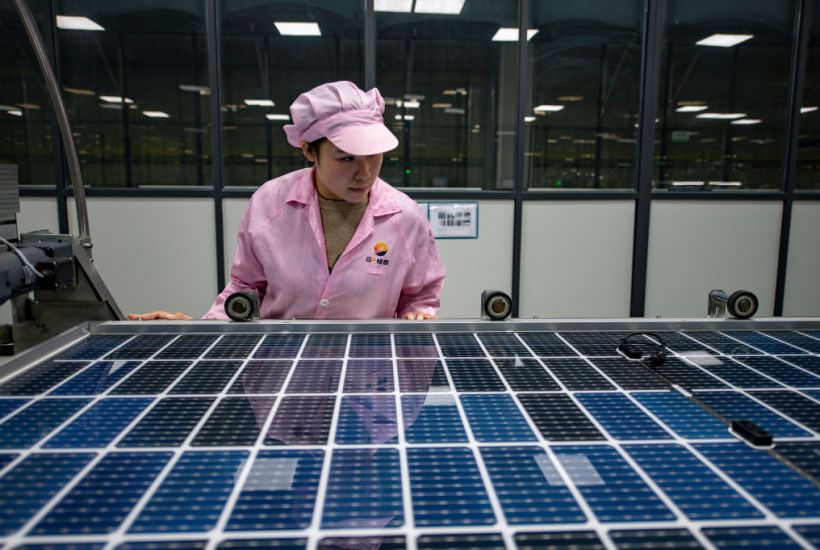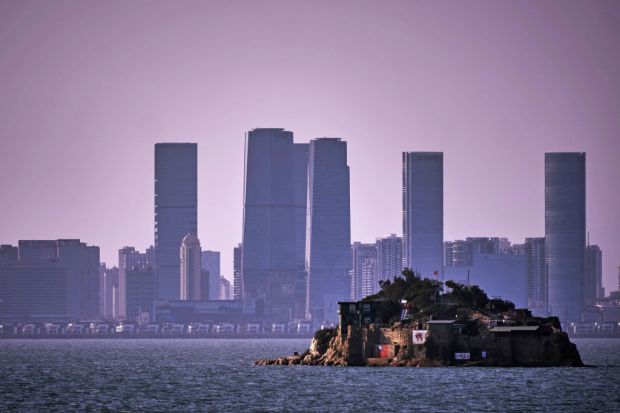China is moving to consolidate and exploit its position as world leader in solar power technologies, by restricting the export of key components. The move could deliver a severe blow to the European and American solar industries and is a stark warning about the dangers of over-dependence on Beijing for critical technologies of the future. It also illustrates the impact of China’s industrial-scale cyber theft.
Beijing is reportedly looking to add raw materials and other vital items used in the manufacture of solar panels to a list of items that could be restricted in order to ‘help safeguard national security’ and require special permission for export. The list does not include the panels themselves, in which China dominates global supplies, thus tightening its grip on the market.
The move comes almost nine years after a US grand jury indicted in absentia five agents of the People’s Liberation Army for hacking the computers of SolarWorld, then America’s biggest solar tech company, and stealing key know-how. The hackers ‘stole thousands of files including information about SolarWorld’s cash flow, manufacturing metrics, production line information, costs, and privileged attorney-client communications,’ according to the May 2014 indictment. The information was made available to Chinese competitors and heavily subsidised solar panels incorporating SolarWorld’s innovations were soon flooding the global market. In 2017, the German parent of SolarWorld filed for bankruptcy, no longer able to compete.
All of which makes the case for extreme caution about creating dependencies on an increasingly aggressive China.
The case still rankles in the US, which watched as China went on to build a dominating position in solar power on the back of stolen technology. It now produces 97 per cent of the world’s wafers – the ultra-thin silicon squares that are pieced together into solar panels – and overall controls three-quarters of the solar energy supply chain, the components and raw materials required by the industry.
Some see the latest Chinese move as part of the on-going tech war with the US – a riposte to Washington’s efforts to restrict Chinese access to advanced chips and the components and equipment necessary to make them. But that is an over-simplification. It is better seen as another chapter in China’s long history of using trade, investment and market access as means of coercion.
Two years ago, Beijing looked to add rare earths to the restricted list, consulting industry executives about how such a ban could hobble the US defence industry. Rare earths consist of 17 obscure minerals that occur jointly in nature and have magnetic and conductive properties that give them multiple and vital applications in our digital lives. They are crucial to modern electronics, used in small amounts in just about everything from microchips, screens, medical devices, rechargeable batteries and magnets to missile guidance systems. China currently mines as much as 80 per cent of the world’s rare earths and does around 90 per cent of the processing, which is expensive and messy. In 2010, China limited exports of rare earths to Japan after a collision involving a Chinese fishing boat and a Japanese coastguard patrol vessel off disputed islands in the East China Sea.
And these are not the only key technologies and materials over which China has a stranglehold. Beijing is leading in what has been dubbed the ‘battery arms race’, dominating the key components and materials for the production of electric vehicles. For example, Chinese companies, with heavy government subsidies and other support, produce almost two thirds of the world’s lithium and Chinese refineries supply around 85 per cent of battery-ready cobalt.
A little over a year ago, the European car industry was given a jolt when China restricted supplies of magnesium, over which China also has a near monopoly. At the time, the motor industry warned of an imminent shutdown, as magnesium is a raw material for the production of the aluminium alloys used for gearboxes, steering columns, fuel tank covers and seat frames. The reason was not clear – it was possibly caused by on-going power shortages in China, which prioritised domestic industry. Europe was particularly vulnerable as it had shut all its own magnesium production, unable to compete with cheap imports from China. The Europeans had accused China of large-scale dumping, selling at below cost to force out rivals, and over two decades Chinese producers created their near monopoly – a familiar accusation of predatory trade practices.
In the case of solar products there is an added ethical dimension, since the centre of the industry in China is Xinjiang province, where the communist party has been accused of detaining over a million Uyghurs and other Muslim minorities in grim ‘re-education’ camps and using forced labour – repression that has UK parliament has described as genocide.
All of which makes the case for extreme caution about creating dependencies on an increasingly aggressive China, though quite where this fits Rishi Sunak’s vague policy of ‘robust pragmatism’ towards Beijing is hard to say. The prime minister has been resisting calls to define China as a ‘threat’ as part of the government’s integrated review of global security.
On Friday he received advice from former chancellor Philip Hammond, who wrote an extraordinary piece for the China Daily, a communist party mouthpiece, in which he said, ‘it is important for the United Kingdom and China to return to business as usual’. Though he did concede that what he called the ‘background noise’ to the relationship over the past three years had been challenging.
By ‘background noise’ he perhaps meant the massive human rights abuses in Xinjiang and Hong Kong, lying over Covid, increased aggression towards Taiwan and Xi Jinping supporting the barbarity of his ‘best friend’ Vladimir Putin – though try spelling that out in the China Daily. Hammond suggested we put all that aside and concentrate on what we have in common, such as ‘free and fair trade’. The latest threats to the solar power supply chain more than demonstrate the absurdity and danger of Hammond’s hollow arguments.
Got something to add? Join the discussion and comment below.
Get 10 issues for just $10
Subscribe to The Spectator Australia today for the next 10 magazine issues, plus full online access, for just $10.





















Comments
Don't miss out
Join the conversation with other Spectator Australia readers. Subscribe to leave a comment.
SUBSCRIBEAlready a subscriber? Log in